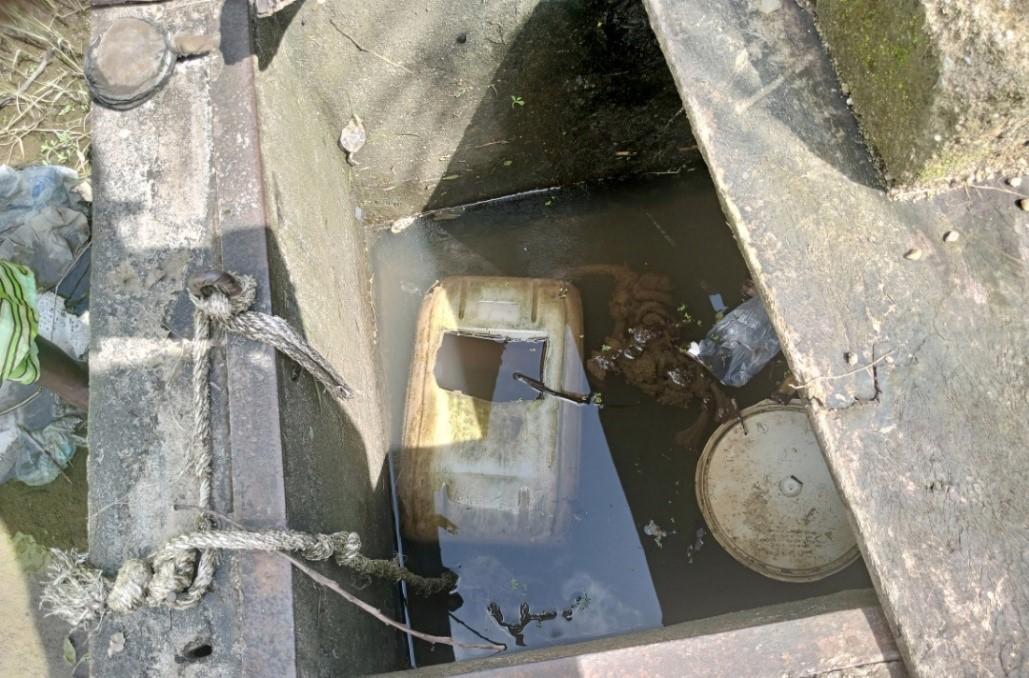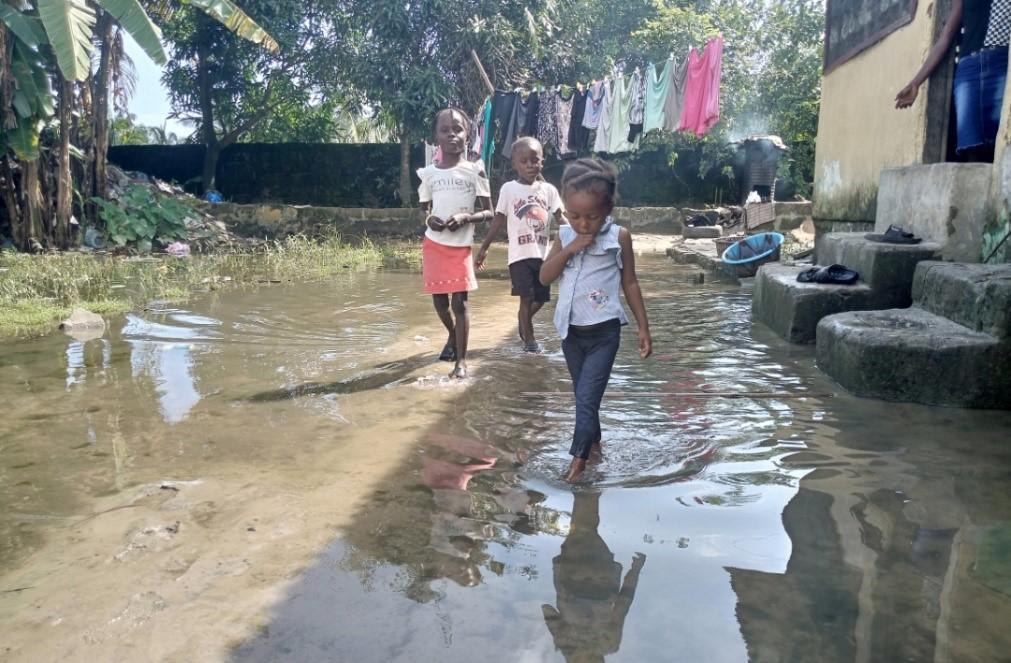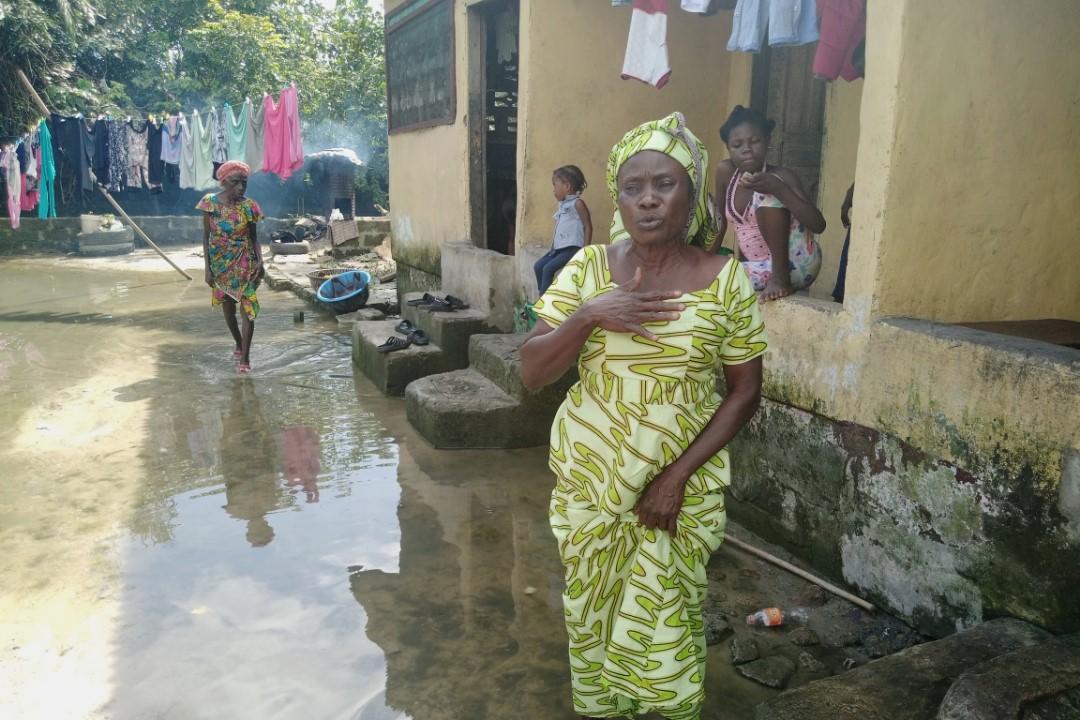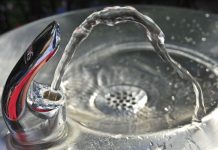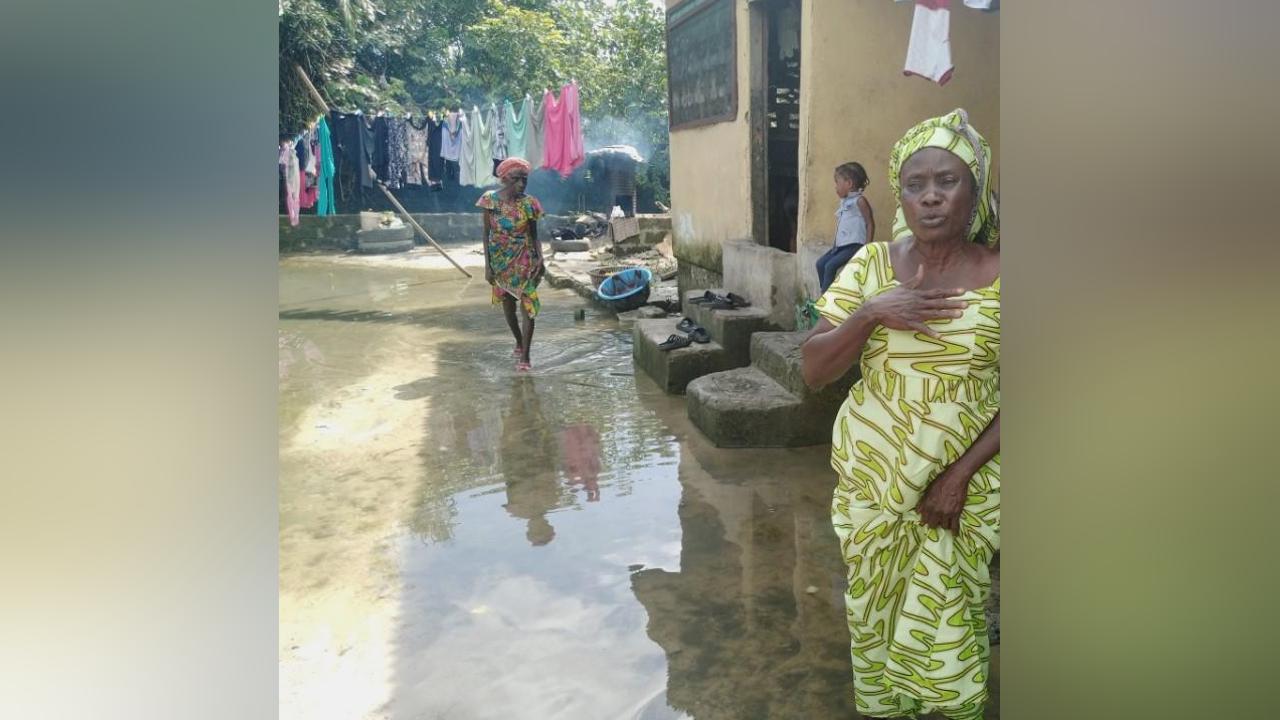
Africa-Press – Liberia. Rebecca Clarke lifts her bare feet to show sores and rashes that cover them, causing her constant pain. The sores started as flooding picked up in her community here in the last two years. A local health provider told her she must let her feet dry but that’s become impossible, according to residents, as dirty water floods the community day after day.Clarke, 58, her grandchildren, and great-grandchildren live together in one of the five apartments here. The Clarke family are some of the oldest residents in Omega Old Field Community. She and her late husband built homes here in 2008. But since 2021 they say it has become unlivable.
“In 2008, water used to come on us, but not like now,” says Clarke. “When the water is full and coming, it can be like the sea, and we got babies here.”
Two days of consistent rainfall mean sleepless nights. Mattresses have to be put on top of cabinets. Water chases them into every corner of the house including the bathrooms. As the water fills in the commode, feces and worse float out. “As the water comes running,…..snakes can be along with the water. Nowhere for our children to play. We are dying here from the water.”
No one disputes that flooding has got worse here in the last two years. In 2023 the National Disaster Management Agency (NDMA) found 3,000 homes in Omega had flooded. The unanswered questions are: what is the cause? And who is responsible?
Clarke and other residents are certain it was caused by poor planning and oversight of the Omega Market that was opened here in 2021 when the Liberia Marketing Association and the government reached an agreement to relocate overcrowded and garbage-strewn Red-Light and Gobachop markets to a newly constructed market here. They say construction blocked drainage systems and filled the wetland areas with debris.
But government claims correct protocols were followed and the flooding is caused by excessive rainfall because of climate change. Liberia has seen a substantial increase in flooding in recent years that experts have attributed to climate change. It is only expected to get worse. No matter what the cause, it is clear that people here are suffering and demanding help.
Clarke insists that as businesses moved into the new Omega market, the community saw the construction of many stores that were not observing building codes.
“I have been here for a very long time,” Clarke says. “When they were building these stores, I told them that the place the water can pass they were blocking, but nobody paid attention to me.” Another resident, Kou Karbeah, 50, squarely blames the government.
“From the time the government announced that they should move the market to Omega, we have been in torment,” she says. “There used to be a lagoon sitting right there, but the people went ahead and brought trucks loads of dirt and filled the whole water area. I expected Public Works (ministry) to move in and put a stop to them. They sat down there and those people closed the place on us. “The Public Works people are doing nothing. They are the same people who can give those places out to those white guys to build the stores, so they want us to die with our children. Because of those stores, the drainages that were here, they closed them. There is nobody to talk for us and when you go to court, da free.”
Johnson Flomo, Community Chairperson, told FPA/New Narratives that a number of efforts by the community to the Ministry of Public Works to find a remedy during the initial stages of construction yielded no results. In a letter dated May, 2020, addressed to Mbutu Nyenpan, then Minister of Public Works, and seen by FPA/NN, the community pleaded for a speedy interview on the blockage of drains.
“They (Ministry officials) came and just looked all over, and then they went back and since then it has been like that,” says Flomo.
Government disputes that construction is the cause. Henry O. Williams, NDMA Director, says that Agency has not carried out an assessment of the market, but he insists it is the result of increased rainfall.
“The rain is persistent and what is happening is that if the rain is not too intense, it will soak away,” says Williams. “But now it has reached that limit of soaking away, and therefore it cannot be absorbed again by the ground so it’s on the surface and it will continue to rise. Houses are in the waterway and those that are poorly constructed will break and those that are a little bit disaster proof will withstand the pressure.”
Building on wetlands is a violation of the Environmental Protection law. The law says structures built in wetlands can be “removed or demolished”. Nathaniel Blama, environmental expert and former director of the Environmental Protection Agency, warns there should be no construction on wetlands without a proper environmental impact study and the approval of the EPA.
“We’re not supposed to just build in them, fill them up without a proper environmental impact study done to know what impact it’s going to have,” Blama says. Blama agrees changing rainfall patterns due to climate change are making things worse but, he says, illegal construction is the cause of the problem. He warns that some stores built in the floodplain may need to be moved to ease the flow of water.
“Omega itself is up on the hill and it comes down towards the road crossing going down into the communities, so when they built those stores without considering drainages of those flood plains it created serious environmental hazards,” Blama says.
But Prof. Wilson Tarpeh, Environmental Protection Agency Executive Director, insists the EPA has “a robust plan to make sure people comply with wetland regulations.” He insisted tall construction was properly licensed and that when the community reports encroachment on wetland, the government acts.
“The community let us know, we go,” Tarpeh says. “But it’s a major challenge on the wetland. And the strange thing about it is that the wetland degradation is not done by the people down the line. It’s done by people who can afford ten trucks, 15 trucks, but we are robust on that.”
Simon Gambleh, Director of Communication and Documentation at the Ministry of Public Works, said all construction in Omega met Liberia zoning standards but he conceded construction was a factor.
“The flooding situation cannot solely be attributed to construction works taking place at the Omega Market,” says Gambleh. “There is a huge density of rain, and there is flooding all over the place that is attributed to some environmental climate issues and there are flooding all over the world not just in Liberia, but globally.”
Gambleh insisted that all store owners first obtained construction permits after the ministry carried out “due diligence” qualifying them. “Before anyone carries on construction work, the law requires that you obtain a construction permit. It could be before construction, it could be after or during construction so the fact that these buildings were erected, they got construction permits that fell within the standard construction works.”
While the debate over cause continues, the community is paying a heavy price. Not only are homes flooded, but water sources are also damaged. As heavy rainfall and dirty water rush into the community, garbage – plastic waste and rotten vegetables – from the Omega market, run into their wells. On a recent visit this reporter saw that two days of consistent rainfall had flooded the well with trash.
Clarke’s household and neighbors told Front Page/New Narratives that they now walk 15 minutes away to other parts of the community to fetch water. Children are missing schools. When the waters reach their doorsteps children spend days indoors. Pupils can only go to school when relatives carry them. Children miss school for several days during heavy rainfall mothers told FrontPage Africa.
Others have lost income. Winston Garnett, the owner of a four-bedroom house, says the tenants in three of the rooms moved out. Garnett’s cash intake was $US540 a year but that is now gone.
“I have been here for eight years and since we built this place, no water used to embarrass us,” says Garret. “After Nuquay built this place we started experiencing an influx of water. This year 2023 water entered my house and took the rooms. The water holds me on my knees.” The 39-year-old father of three is jobless. He says his family now survives from his wife’s petty trade selling cold soft drinks, and other energy drinks on the streets.
As rain continues to intensify, more and more homes here are hit by flooding. The community’s desperate calls for help show no sign of being met. The only hope people here say is that the new government of Joseph Boakai might offer help.
For More News And Analysis About Liberia Follow Africa-Press

